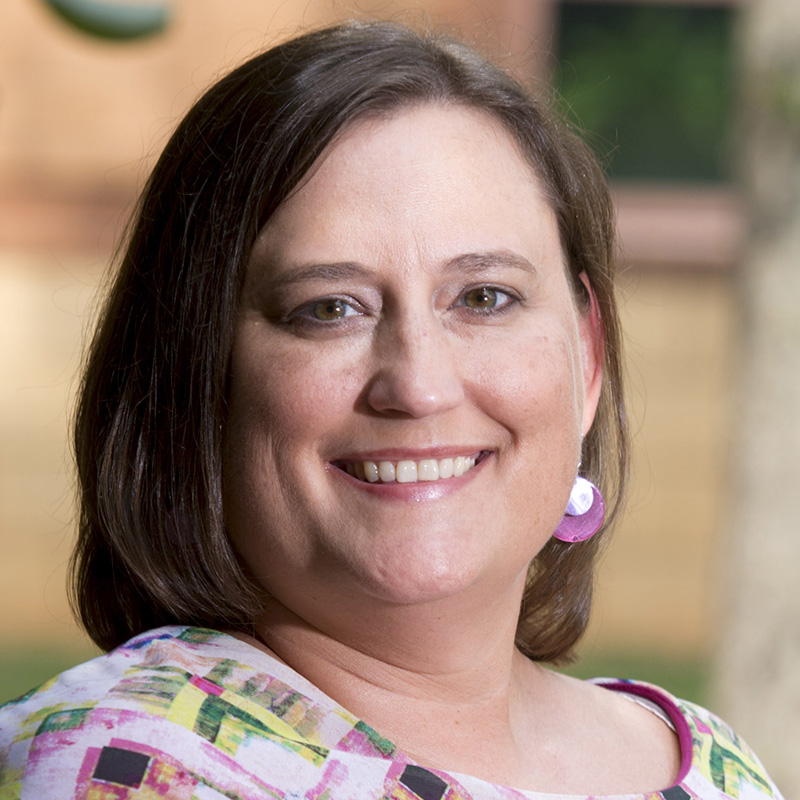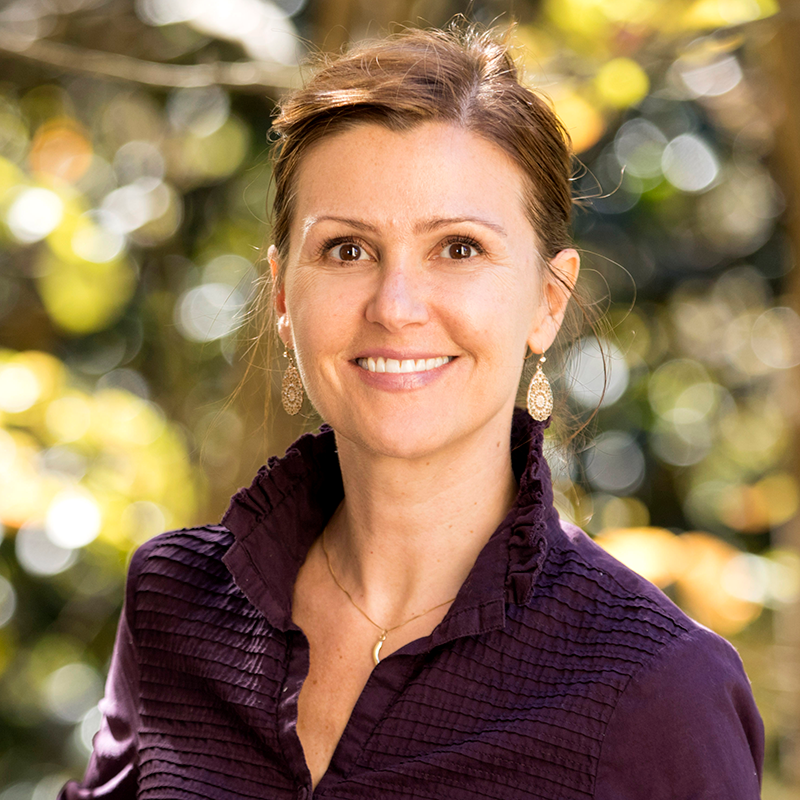The environmental health major curriculum involves multiple scientific fields of study. The first two years are spent taking basic and advanced courses in biology, chemistry, physics, math, and microbiology, in addition to other UGA core requirements. During the junior and senior years, students take applied environmental health science courses in such areas as air, water and noise pollution; solid and hazardous waste management; environmental toxicology; industrial hygiene; food microbiology; epidemiology; and public health law. Students have considerable freedom in choosing additional courses of special interest (Major Electives). Students may choose courses among offerings from the Environmental Health Science (EHS) Department and a variety of other departments to focus on a specialty area, including Industrial Hygiene, Environmental Protection, or Public Health.
Permanent and adjunct faculty members, rather than graduate students, teach the upper-division courses in the EHS Department. Many of the EHS classes have a lecture format and are typically small in size (less than 30 and up to 50 students), while other classes have a small discussion group format and 10 to 20 students.
Students have the opportunity to earn course credit by participating in research projects with EHS faculty and can present their findings to peers and other faculty by participating in the Center for Undergraduate Research Opportunities. Students are eligible for competitive funding for research projects through the Undergraduate Research Initiative.
EHS students gain practical experience and problem-solving skills through field experiences and co-ops, which are an integral part of the EHS degree program at UGA.
Environmental Health Science undergraduate students gain practical experience and problem-solving skills through field experiences (internships), an integral part of the EHS degree program at UGA. As interns, students work with companies, not-for-profit organizations, academic researchers, and federal, state, or local government agencies. They receive from 3 to 9 hours of course credit depending upon the amount of time spent as an intern. Most interns work from 12 to 40 hours per week for a 10 to 15 week period and are compensated by the host organization at a rate of $7-15 per hour. Students consistently rate the field experience as one of the most valuable parts of their undergraduate education in environmental health science.
Students obtain field experiences by working with the EHS Field Experience Coordinator Dr. Anne Marie Zimeri and their advisor to identify, apply for, and secure a position that meets their personal interests and timetable. Many students complete their field experience during the summer between their junior and senior year although other periods are equally acceptable and common. Students are encouraged to begin planning their field experience early in their studies to ensure their interests can be met.
Field Experience Sponsors
Institutions, where EHS students have completed field experiences or co-ops, include the U.S. Environmental Protection Agency (EPA), Centers for Disease Control and Prevention (CDC), Agency for Toxic Substances & Disease Registry (ATSDR), Georgia Power, CIBA Vision, Williams Environmental Services, Duracell USA, and several environmental consulting firms. Field experiences have also been completed at state and local agencies, including the State of Georgia Environmental Protection Division (EPD) and county health departments. EHS students can compete for field experiences sponsored by national organizations such as the U.S. Public Health Service, Department of Energy, Oak Ridge Institute for Science and Education (ORISE), the Chemical Industry Institute of Toxicology (CIIT), the Society of Toxicology, and other organizations.
Co-operative Education Programs
EHS majors may elect to participate in an approved cooperative education program, instead of a field experience. Students interested in obtaining a co-op should see Dr. Anne Marie Zimeri, EHS Field Experience Coordinator.
Obtaining a Field Experience
Like every academic and employment-related procedure, the field experience process requires that administrative and other forms be completed by the student, the EHS Department, and the host organization. All of the required forms are available for download from this website. Students are strongly encouraged to obtain the forms in this manner although they are also available from the EHS Field Experience Coordinator.
The steps required of students are detailed below in the order in which they must be completed. The six-step process outlined below begins by checking your eligibility and ends with the submission of a report by you to the Field Experience Coordinator.
*Step 1: Check Eligibility for Field Experience
The first step in the process is to determine whether you are eligible for field experience. Students must meet these basic eligibility criteria to begin the field experience process:
- Declared major in Environmental Health Science.
- Satisfactorily completed 6 credit hours of environmental health science coursework including EHSC 3060 Introduction to Environmental Health Science.
- In good academic standing (i.e., cumulative GPA of at least 2.0).
- After meeting these criteria, you are prepared to apply for a field experience.
*Step 2: Apply for a Field Experience
Eligible students may apply for a field experience at any time but at least 10 weeks in advance of the academic term in which the field experience is to begin. To apply, students must complete the following tasks:
- Prepare a resume of your academic and employment experience.
- Complete the field experience preferences questionnaire (PDF format).
- Submit your resume and questionnaire to Dr. Anne Marie Zimeri.
- Meet with Dr. Zimeri to review potential field experience sponsors and to identify a field experience assignment that satisfies your interests.
- Register for at least 3 credit hours of EHSC 3910 for the academic term that corresponds to the period during which you will undertake your field experience.
- When these steps are completed you are prepared to accept a field experience.
*Step 3: Accept a Field Experience
Several forms must be completed by you, the EHS Department, and the sponsoring organization to establish your field experience formally. This paperwork is intended to ensure that all three parties understand the terms and conditions of the field experience. The paperwork is also intended to ensure that all parties are protected in the unlikely event of an accident.
- Complete the Field Experience Approval Form (PDF format).
- Review and sign the Professional Field Experience Training Agreement(PDF format).
- Complete the Student Field Experience Agreement Form (PDF format).
- Complete the Verification of Insurance Coverage Form (PDF format).
- Complete the Waiver of Liability Form (PDF format).
- Return the completed forms above to Dr. Zimeri prior to the beginning of your field experience.
- Now you are ready to begin the field experience.
*Step 4: Begin a Field Experience
As an intern, you are a representative of the Environmental Health Science Department, the University of Georgia, as well as yourself. The field experience is a professional setting and is an opportunity for you to learn outside of the classroom. Be inquisitive, act responsibly, have a positive attitude, and be adaptable. Remember that what you get out of the field experience will be directly proportional to what you put into the field experience. Good luck and do well.
After settling into your field experience, the sponsor will evaluate your performance and discuss their results with you.
*Step 5: Mid-Term and Final Evaluations
A designated member of the sponsoring organization will review your performance at the mid-point and end of your field experience. Periodic review of personnel is a universal and essential element of human resource management in organizations of all types. One goal of the evaluations is to ensure that the sponsor and you discuss the field experience from both of your perspectives. Another goal is to make you aware of your strengths in what may be your first professional work experience and to provide you the feedback needed to help you develop professionally and prepare for a career in environmental health science.
The field experience sponsor will complete the following forms in conjunction with your performance review and will submit them to the EHS Field Experience Coordinator. Please review them before beginning the field experience so that you are aware of the expectations of your sponsor and the EHS Department.
After your last day as an intern and when your final evaluation is done, you are ready to complete the internship.
*Step 6: Finish
To complete the field experience, you will complete two final tasks. One task is to evaluate the field experience, both the sponsor and the EHS Field Experience Program, using the forms available below. The other task is to complete a report on your field experience. Complete both tasks and submit the forms and report to the Field Experience Coordinator, Dr. Anne Marie Zimeri.
- Evaluate the field experience and sponsor in PDF Format.
- Evaluate the EHS Field Experience Program in PDF Format.
Write a report on your field experience that describes your responsibilities as an intern and summarizes what you learned from the experience. The report should be approximately 3 double-spaced pages in length.
Currently enrolled students who would like to declare an intended major in environmental health science should login to Athena. From Athena’s “My Programs” tab, you will be able to add/delete majors, emphasis areas, minors, and certificates.
Please contact Undergraduate Program Coordinator Anne Marie Zimeri if you are interested and/or have questions about changing your major to environmental health science.
Epidemiology
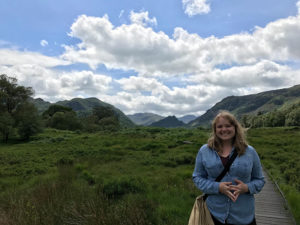 Britt Cantrell Carter (BSEH ’09) is epidemiology manager at the Gwinnett, Newton, and Rockdale County Health Departments. Alongside a team of epidemiologists, nurses, communicable disease specialists and others, she monitors and assists in the prevention of the spread of infectious diseases in those communities. Britt found Dr. Luke Naeher’s ‘Environmental Air Quality’ and Dr. Anne Marie Zimeri’s ‘Solid and Hazardous Waste’ classes to be crucial to her education in the field.
Britt Cantrell Carter (BSEH ’09) is epidemiology manager at the Gwinnett, Newton, and Rockdale County Health Departments. Alongside a team of epidemiologists, nurses, communicable disease specialists and others, she monitors and assists in the prevention of the spread of infectious diseases in those communities. Britt found Dr. Luke Naeher’s ‘Environmental Air Quality’ and Dr. Anne Marie Zimeri’s ‘Solid and Hazardous Waste’ classes to be crucial to her education in the field.
Within just a few months of graduating from UGA, Britt found a job as an environmental health specialist for Gwinnett County, but always knew she wanted to focus on the intersection of environmental health and infectious diseases. After two years in the field, she returned to school full-time as an MPH student at Georgia State College before returning to a local health department. In 2017, she became a NEHA-certified Registered Environmental Health Specialist/Registered Sanitarian.
Britt has a number of fond memories from her time as an EHS undergraduate student, including waking up early to join the Environmental Health Science Club on a mission to do roadside cleanup along College Station Road. To this day, she still remembers reading the 2009 Intergovernmental Panel on Climate Change Report for the first time and wondering how one could possibly deny the validity of climate change.
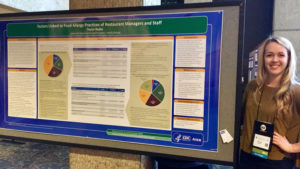 After graduating with a B.S. in environmental health, Taylor Radke (BSEH ‘12, MPH ‘14) went straight into UGA’s Master of Public Health program, focusing on epidemiology. Since then, she’s been working as a public health analyst with the Centers for Disease Control and Prevention studying a variety of major public health issues ranging from women’s health to the opioid epidemic and food safety. A CDC ORISE Fellowship in food safety allowed her to make use of her background in both environmental health (knowledge) and epidemiology (analysis).
After graduating with a B.S. in environmental health, Taylor Radke (BSEH ‘12, MPH ‘14) went straight into UGA’s Master of Public Health program, focusing on epidemiology. Since then, she’s been working as a public health analyst with the Centers for Disease Control and Prevention studying a variety of major public health issues ranging from women’s health to the opioid epidemic and food safety. A CDC ORISE Fellowship in food safety allowed her to make use of her background in both environmental health (knowledge) and epidemiology (analysis).
After taking Dr. Anne Marie Zimeri’s ‘Intro to Environmental Health Science’ on a whim, Taylor ended up switching her undergraduate major from Biology to Environment Science, as well as serving as a College of Public Health Ambassador during her junior and senior years. Through her experiences so far, she’s had the exciting opportunity to travel across the country presenting her research at conferences for organizations like the National Environmental Health Association, International Association for Food Protection, and Integrated Foodborne Outbreak Response and Management. Taylor hopes to continue to grow on a career path that combines her passion for the environment with the rigorous data-driven methodology of epidemiology.
Industrial Hygiene
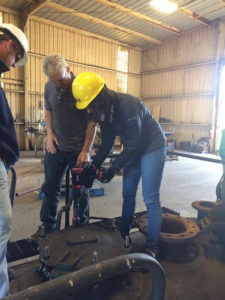 Yasmin Asghari graduated with B.S. in environmental health in 2015. She now works as a Senior Environmental Health Safety and Sustainability (EESS) Leader at GATX Corporation, which manages one of the largest railcar leasing fleets in the world. AT GATX, Yasmin provides EHSS project support to ensure that railcar maintenance facilities meet annual EHSS objectives, targets and goals. Last year, she worked to implement auto-darkening helmets to reduce eye-related injuries and improve respiratory protection among workers, and is now responsible for the building of a network-wide sustainability platform.
Yasmin Asghari graduated with B.S. in environmental health in 2015. She now works as a Senior Environmental Health Safety and Sustainability (EESS) Leader at GATX Corporation, which manages one of the largest railcar leasing fleets in the world. AT GATX, Yasmin provides EHSS project support to ensure that railcar maintenance facilities meet annual EHSS objectives, targets and goals. Last year, she worked to implement auto-darkening helmets to reduce eye-related injuries and improve respiratory protection among workers, and is now responsible for the building of a network-wide sustainability platform.
During her time as a student in the UGA Environmental Health Science Department, Yasmin found her classes in ‘Industrial Hygiene’ most valuable to her current occupation, although ‘Environmental Chemistry‘ was still crucial to her understanding of green chemistry used a GATX. Her participation in the EHS Club was also a great tool for getting her industry exposure and better acquainted with her options post-graduation. Today at GATX, she frequently travels across North America for auditing and management assignments, and has also enjoyed the opportunity to attend conferences like that of 3M’s Emerging Leaders.
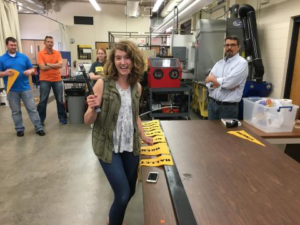 Laura Hallett’s (BSEH ‘15) experiences in the field of industrial hygiene as an undergraduate student in the UGA EHS program motivated her to seek a Master of Science in Occupational and Environmental Health from the University of Iowa in 2017. She now works as an associate health scientist at Cardno ChemRisk in Pittsburg, Pa. In UGA’s EHS program, she particularly enjoyed classes that dealt with such issues as environmental concerns in the developing world, air quality, and other public policy matters, and came to think of herself more as a global citizen. In her current work, she most often returns to what she learned in Toxicology and Epidemiology, as most of her responsibilities fall under the umbrella of classic industrial hygiene.
Laura Hallett’s (BSEH ‘15) experiences in the field of industrial hygiene as an undergraduate student in the UGA EHS program motivated her to seek a Master of Science in Occupational and Environmental Health from the University of Iowa in 2017. She now works as an associate health scientist at Cardno ChemRisk in Pittsburg, Pa. In UGA’s EHS program, she particularly enjoyed classes that dealt with such issues as environmental concerns in the developing world, air quality, and other public policy matters, and came to think of herself more as a global citizen. In her current work, she most often returns to what she learned in Toxicology and Epidemiology, as most of her responsibilities fall under the umbrella of classic industrial hygiene.
One of her favorite classes at UGA was ‘Organic Agriculture: Ecological Agriculture and the Ethics of Sustainability,’ where she was able to spend many mornings working in the field—an experience that fundamentally changed how she looks at the food she eats and gave her a great deal of respect for small farmers. The supply of fresh blueberries to pick was a particular perk.
 Callie Manley, who graduated with a B.S in environmental health in 2016, is an industrial hygiene specialist in Emory University’s Environmental Health & Safety Office. There are a number of potential hazards unique to occupations found on university campuses, including lab researchers, construction workers, maintenance technicians and animal research scientists. Callie’s program is charged with ensuring all university employees are properly informed, trained, and operating in a safe manner. During her time at UGA, Callie found classes such as ‘Environmental Law,’ ‘Industrial Hygiene,’ and ‘Environmental Health’ most applicable to her current career.
Callie Manley, who graduated with a B.S in environmental health in 2016, is an industrial hygiene specialist in Emory University’s Environmental Health & Safety Office. There are a number of potential hazards unique to occupations found on university campuses, including lab researchers, construction workers, maintenance technicians and animal research scientists. Callie’s program is charged with ensuring all university employees are properly informed, trained, and operating in a safe manner. During her time at UGA, Callie found classes such as ‘Environmental Law,’ ‘Industrial Hygiene,’ and ‘Environmental Health’ most applicable to her current career.
Callie enjoys working with industrial hygiene monitoring, ensuring workers are not overexposed to certain chemicals and hazards including silica and asbestos at active construction sites, formaldehyde in gross-anatomy and animal research laboratories, and heat stress and exposure in steam tunnels and other confined spaces. One of her favorite duties at Emory is the monthly meeting with her “zone.” Over donuts, Callie meets neighboring supervisors and mechanics to discuss “toolbox topics” and any other safety concerns that have arisen in the past month. The event serves as a regular reminder of the importance of job safety and ensuring that all workers are able to return home to their loved ones each day.
Medicine and Health Services
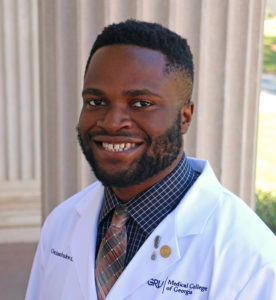 As a medical student at August University/UGA Medical Partnership, EHS alumnus Osii Mbata (BSEH ‘14), has found opportunities to integrate his training in medicine with public health issues. His work with rehab centers has allowed him improve patient outcomes and determining and studying common risk factors for relapses. He’s also had the privilege of helping create proposals for school-based health centers with the hope of improving healthcare access for underserved children and reducing reliance on emergency services.
As a medical student at August University/UGA Medical Partnership, EHS alumnus Osii Mbata (BSEH ‘14), has found opportunities to integrate his training in medicine with public health issues. His work with rehab centers has allowed him improve patient outcomes and determining and studying common risk factors for relapses. He’s also had the privilege of helping create proposals for school-based health centers with the hope of improving healthcare access for underserved children and reducing reliance on emergency services.
Osii strongly believes that the classes he took as an undergraduate at UGA in Environmental Health Science were crucial to his desired career and provided practical applications of the concepts he would most rely on. If he had to choose, the most impactful class was Dr. Marsha Black’s ‘Issues in the Developing World’, which exposed him to developing health crises the world over. Since then, he’s hoped that in the future he might be able to join mission trips in improving healthcare and training providers abroad. Similarly, the undergraduate research internship Osii underwent with Dr. Black was his first practical experience in that area that brought together both conditions of healthcare and the environment, not to mention including opportunities to travel in the field, collecting various specimens at different locations, such as oysters in the waterways of Brunswick, Georgia.
Sustainability
 For Ariell Lawrence (BSEH ’11), earning a B.S. in environmental science has served as an unlikely launchpad into a career in the film and TV industry. Since 2017 and with some additional training from the Georgia Film Academy, she’s wrapped up work as a production assistant in props on MTV’s ‘Scream’ Season 3, as well as ‘Lore’, an Amazon original series that sometimes touches on public health concerns. Ari sees herself as a steward of the environment on the set and is now training to become a dedicated “Eco PA,” where she’ll be responsible for keeping film production ecologically responsible. In the role, she will make sustainable practices are in place, such as recycling batteries used on the set to donating and, reusing props, clothing and set decorations.
For Ariell Lawrence (BSEH ’11), earning a B.S. in environmental science has served as an unlikely launchpad into a career in the film and TV industry. Since 2017 and with some additional training from the Georgia Film Academy, she’s wrapped up work as a production assistant in props on MTV’s ‘Scream’ Season 3, as well as ‘Lore’, an Amazon original series that sometimes touches on public health concerns. Ari sees herself as a steward of the environment on the set and is now training to become a dedicated “Eco PA,” where she’ll be responsible for keeping film production ecologically responsible. In the role, she will make sustainable practices are in place, such as recycling batteries used on the set to donating and, reusing props, clothing and set decorations.
After completing her degree at UGA, Ariell gained experience in the field as intern with Georgia Power’s Environmental Affairs team, and as a recycling coordinator with the National Institutes of Health in Maryland. At the NIH, Ariell regularly called on her experiences of classes with Dr. Anne Zimeri, Dr. Marsha Black, and Dr. Mary Ann Smith, and during the government shutdown in 2013, was not furloughed due to her important status as a US Public Health Service officer. In this role, Ariell had the opportunities to work as member of the stateside administrative staff supporting USPHS officers deployed to Liberia during the 2014 Ebola Epidemic.
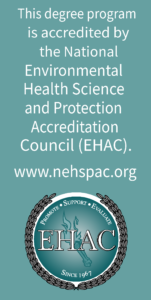 Environmental Health Science is the study of biological, chemical or physical agents in the environment and their effects on human health and ecological systems.
Environmental Health Science is the study of biological, chemical or physical agents in the environment and their effects on human health and ecological systems. “Public health encompasses so many aspects that are important to our everyday lives. While it has been especially important in recent years with COVID-19 affecting the world, public health also teaches about air quality, toxicology, waste management, and how pollution affects human physiology. This variety of subjects that are all relevant now and in the future is why I wanted to pursue a degree in public health.”
“Public health encompasses so many aspects that are important to our everyday lives. While it has been especially important in recent years with COVID-19 affecting the world, public health also teaches about air quality, toxicology, waste management, and how pollution affects human physiology. This variety of subjects that are all relevant now and in the future is why I wanted to pursue a degree in public health.”









